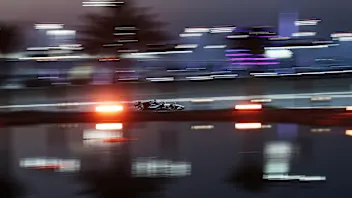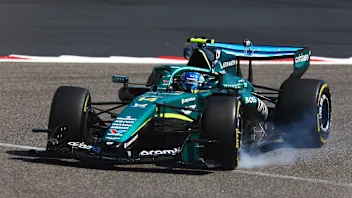After losing out in a straight fight with Mercedes team mate Lewis Hamilton at Suzuka, Nico Rosberg says victory is his sole objective at Sochi Autodrom this weekend, as he looks to cut into his current 10-point deficit in the title hunt.
In a frank interview, Rosberg also touches on what defines 'star quality' in F1 racing, how mentally tough the championship fight has proved, and why Jules Bianchi won't be far from his thoughts in Russia...
Q: Nico, you said that whoever remains the coolest will bag the title, so how is your 'state of cool' after two difficult races?
Nico Rosberg: Did I really say that? I don't think that I said that - it's consistency from now to the end of the season. That's what I am trying to do - and to win, of course. We have four races to go and it is very close on the points, so let's go for it.
Q: Lewis has won eight races so far, compared to your four, but you are still only 10 points behind. That shows how important consistency is - but does it also give you hope?
NR: I don't think about the past, I just think about the moment. As I just said, four races to go, it is very close and anything can happen. I need to do the better job in these four races that are ahead of us. I don't think beyond - or behind - that!
Q: Have you changed your approach at all, now that we're into the final races?
NR: No. I will still go out here in Sochi on Sunday and try to win the race. It's not about trying to get points or whatever…
Q: So there is no strategic reasoning? It's win or nothing - there are no thoughts about settling?
NR: It's win!
Q: You claimed pole position in Japan, but couldn't bring the win home. Can you talk us through the race, and the emotions that were going on behind your visor?
NR: The glitches came with the intermediate [tyre]. As a team we had the wrong set-up on the car for the intermediates - we had big degradation. Red Bull were quicker than us on intermediates. We had a lot of oversteer and my conclusion is that I struggled more than my team mate did. It was a very difficult balance and I just didn't feel comfortable in the car. It was always twitching at the rear and at a track like Suzuka when you don't have a stable rear you pay dearly. I wasn't able to push the way I would have liked. We couldn't really prepare for that situation because it was the first time that we had rain that weekend. It was what it was.
Q: So it was a disappointment?
NR: After the race no, because I didn't really think about the race after [Jules Bianchi's crash]. But now, in hindsight, yes it was a disappointment.
Q: How do you condition your mindset to only focusing on victory - and how much toll does it take to be on a permanent state of alert?
NR: To be honest, it is not any different to the past. It's almost a bit to the contrary because I am in an unbelievable situation: with this car I go to every race knowing that I can be on pole position and win the race. That is so cool. Maybe I even enjoy it a bit more than before.
Q: But sometimes that doesn't really show...
NR: Maybe what happened in Suzuka is still on my mind. It's the first time back in the paddock and right now it is difficult to talk about having such a great opportunity this season when one of my colleagues is seriously injured. That is on my mind at the moment.
Q: You have been racing against Hamilton, and indeed other drivers on the F1 grid, since you were a teenager. Do you ever get a bit of deja vu on Grand Prix weekends?
NR: It is strange, yes. Fifteen year ago Lewis and I were on holiday in Greece, saying 'imagine if one day we fought for the F1 championship in the best team against each other' - and now we are doing it. That's incredible!
Q: Back then, did you anticipate just how difficult personally the fight would be?
NR: It was also difficult back then. Now it is just a bit more intense.
Q: But fighting the same driver or drivers, year after year...
NR: No, it's a good challenge.
Q: Ideally the champion in a highly visible sport like Formula One racing should have star qualities. What does 'star quality' mean for you?
NR: That you are a unique person. Polarising is important - to have star qualities, have an opinion.
Q: How is the situation within the team? Can you avoid divisions - or is that just a human part of an intra-team title fight?
NR: It is something that can happen, of course. But as a team we have really good leadership and they know that such a thing must not happen in a team - because that would be the beginning of a downward spiral in terms of team success. You must remain united, as it is the only way to dominate F1 in the long run. Our team leadership knows that, and that filters through the whole company.
Q: You grow your own vegetables. Is the 'slow life' of watching them grow a counterbalance for the hectic life of an F1 driver?
NR: No, I don't need that contrast. It's just the joy to live a healthy life. My wife Vivienne is an amazing cook, and it is so cool to go together in the veggie garden, pick what we want and make incredible food from self-grown produce.
Q: Nobody has a track record in Sochi. How did you prepare?
NR: In the simulator, like most of my colleagues. I can walk around the track - that's it.
Q: What is your impression of the track?
NR: It's good. It's a bit like Valencia, and the long straights should allow some good overtaking. It will be an exciting race.
Q: Will the layout benefit Mercedes?
NR: I think every track is to our benefit at the moment; it doesn't matter where we go. But, of course, a long straight is always good! (laughs)
Next Up
Related Articles
 What we learned from Day 1 of the second Bahrain test
What we learned from Day 1 of the second Bahrain test Honda issue statement amid Aston Martin’s test struggles
Honda issue statement amid Aston Martin’s test struggles/16x9%20single%20image%20-%202026-02-20T151837.591.webp) AS IT HAPPENED: Day 3 of the second pre-season test in Bahrain
AS IT HAPPENED: Day 3 of the second pre-season test in Bahrain Ferrari headline the innovations as F1 testing resumes
Ferrari headline the innovations as F1 testing resumes/Verstappen%20Bahrain%20Test%201.webp) Who’s driving on Day 2 of the second Bahrain test
Who’s driving on Day 2 of the second Bahrain test The top tech innovations from 2026 pre-season testing
The top tech innovations from 2026 pre-season testing